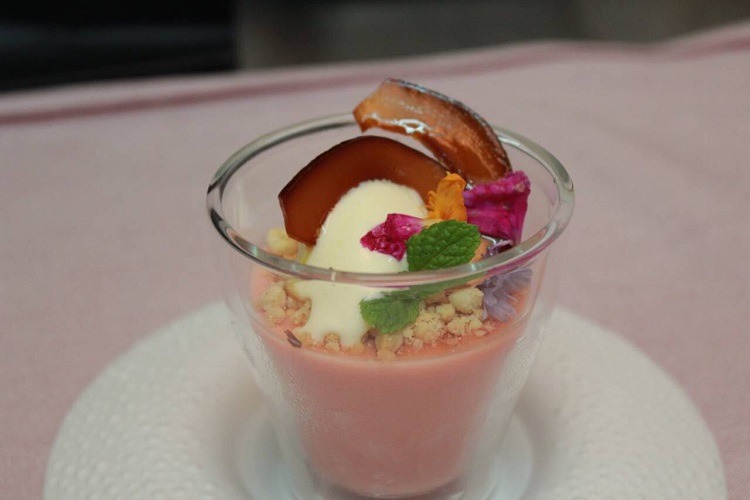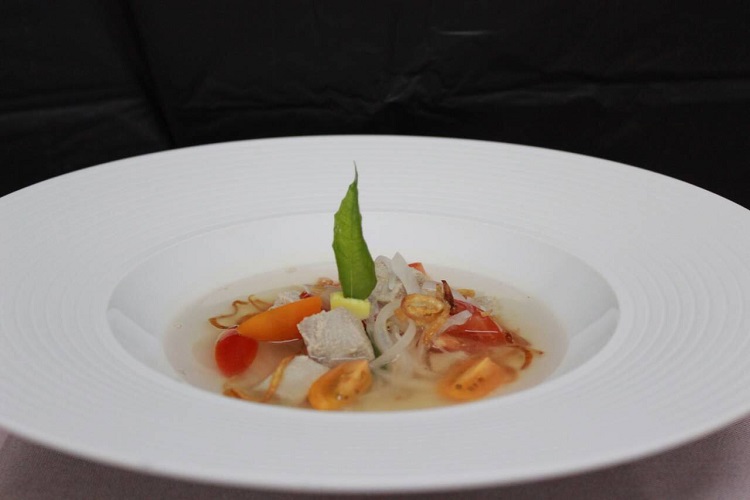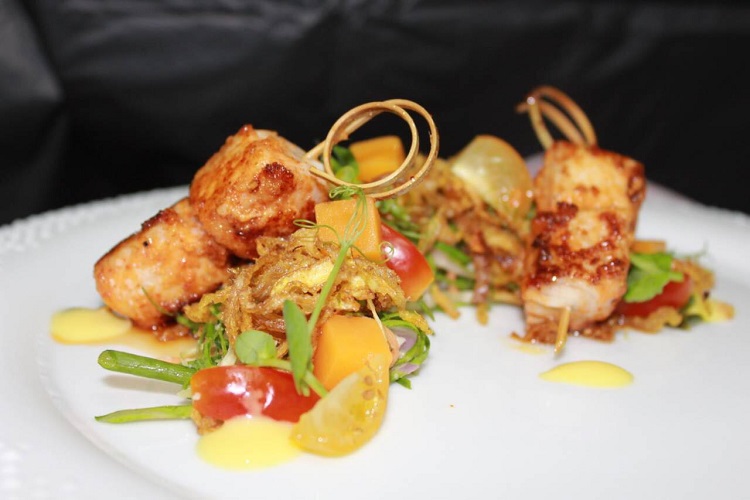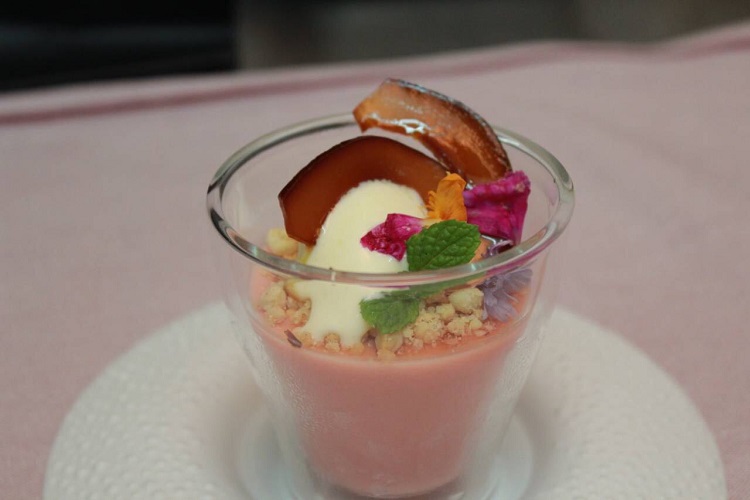Fine Dining At Ba'theli Seeks To Teach Tourists About Maldivian Cuisine
During my dinner at Ba'theli, the world's only Maldivian fine dining restaurant, set on an open-air wooden ship on the island resort Milaidhoo in the Maldives, I wonder why no one has opened a Maldivian fine-dining restaurant in Manhattan. Maybe because it wouldn't be the same – you wouldn't be able to go barefoot, the way most Ba'theli guests are, and you wouldn't get to look at the stars and listen to the Indian Ocean while enjoying your garudhiya, the national dish of the Maldives.
Earlier, I attended a cooking class on Milaidhoo taught by Ba'theli's chef, Ahmed "Seabass" Sivath, and learned how to make garudhiya. The clear fish soup, like most Maldivian cuisine, is simple, healthy, and delicious; you boil cubes of tuna (a fish that's so plentiful around here that locals call it "kandu kululhu," Dhivehi for "sea chicken"), and season the water with salt, curry leaves, and onion. My waiter suggests that I pour a bit of the soup onto my rice and garnish it with lemon and chili. I dip curry-leaf brown bread in curry sauce. Curry is everywhere in the Maldives, thanks to the Indian influence from the old maritime trade route. The restaurant's name, Ba'theli, is a nod to that era, to thousands of years of solitude when the only contact Maldivians had with foreigners comprised boats bearing ceramics, silk, turmeric, cloves, and ginger. In the Dhivehi language, those trade ships are called "ba'thelis."
Until the 1970s, when tourism began to infiltrate this isolated collection of 26 atolls, pretty much everything the Maldivians had came straight out of the ocean or from the trees. To barter with traders sailing from Indonesia and India, Maldivians gathered cowry shells, a trade currency used for centuries, and wove rope out of coconut fiber. On the capital island, Male, there's a 400-year-old mosque constructed of coral. Lacking irrigation, Maldivians ate fish with whatever was available locally – coconuts, mostly; but unexpected produce, too, like screwpine, a fruit that grows from trees on every Maldivian island. Screwpine is versatile and the Maldivians are creative with it. They pull the big seeds from the fruit, remove the red skin from each seed, cook the flesh, and use the extract. You can drink a glass of it or use it as an ingredient in custards or ice creams.
Inevitably, vacationers changed the Maldives; fishing remains the country's largest industry, but these days tourism is a close second and steadily gaining. The atolls of the Maldives are split into close to 1,200 islands, only a couple hundred of which are inhabited. The inhabited islands have historically been either local islands (where Maldivians live and where tourists aren't allowed) or specialized islands (a prison, the president's island, an island with a psychiatric hospital, an island for trash, etc.). But now, over 100 are tourist islands, and that number continues to grow. A tourist island is one that, like Milaidhoo, has been turned into a resort. Now all kinds of things that Maldivians never had before are being imported for resort guests – frozen food and chickens, for example. Alcohol, normally prohibited in Muslim countries, is imported, too, though it's available only on the resort islands. Furthermore, whereas past generations spoke nothing but Dhivehi, almost everyone today speaks English to some degree. So to some Maldivians, including Milaidhoo's general manager Shuhan Ahmed, there's a sense of urgency around retaining Maldivian culture and a desire to teach tourists about the Maldives, rather than to make the Maldives more palatable to tourists.
"There's so much tourism these days," Ahmed said. "The last thing we should be doing is diluting our cuisine."
Many other Maldivian resorts rely on buffets to feed their guests, and while some of the food may be Maldivian, the menu is usually supplemented with steaks, white dinner rolls, and other dishes from around the world. Ba'theli not only serves exclusively Maldivian food; it elevates it.
"We didn't want a buffet," Ahmed said. "We wanted a chef to put love into these dishes, and to present the food the way they present food in fine French restaurants: plated, served by waiters." Since the resort and the restaurant opened about a year ago, Sivath has been taking authentic Maldivian dishes and deconstructing and then reconstructing them. A good example is his version of boashi satani, the banana blossom salad, a popular Maldivian side dish. In Maldivian homes, whoever is cooking mixes a huge batch of tuna, coconut, and onion for the family, and serves a few fried banana blossoms separately. Whereas the traditional recipe, despite its name, neglects the banana blossom and lets the tuna flavor take over, at Ba'theli, the banana blossom is the highlight.
My dessert is a screwpine panacotta. Sipping my Malbec (the international wine list is the only non-Maldivian part of the menu), searching the dark ocean for bioluminescent phytoplankton (someone told me you can see it here sometimes), I really feel that I'm on the other side of the world, not just because of the giant time-zone leap, but because despite all the tourism, the Maldives maintain an air of isolation, a vestige of its recent past. The quiet pulses in my head here, the way it does in the desert.
Ahmed said that as tourism continues to develop in the Maldives, he hopes that other resorts will look to Ba'theli as an example when they're creating their dining programs. I don't know why they wouldn't. Gone are the days when a cool trip meant hiding in a resort in some far-flung country and eating bland western food. Tourists seek authenticity now, oxymoronic as that may be. They want local and fresh and unusual. They don't even want to see themselves as tourists. They (okay, "we") prefer "traveler." They want to learn something about wherever they are and come home not just with a tan, but with knowledge and a little more worldly sophistication, as well as most interesting food pictures.
"I want people to learn about Maldivian cuisine," Ahmed said. "That won't happen in the buffet line."

.jpg)


